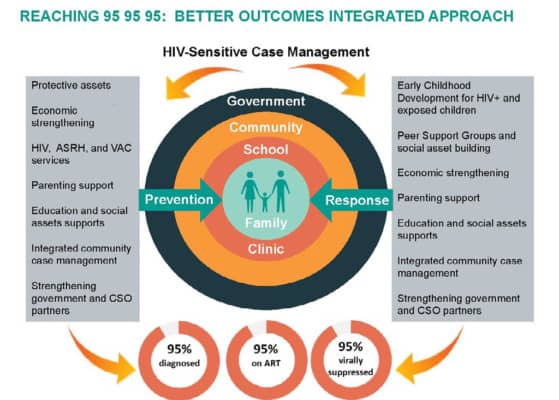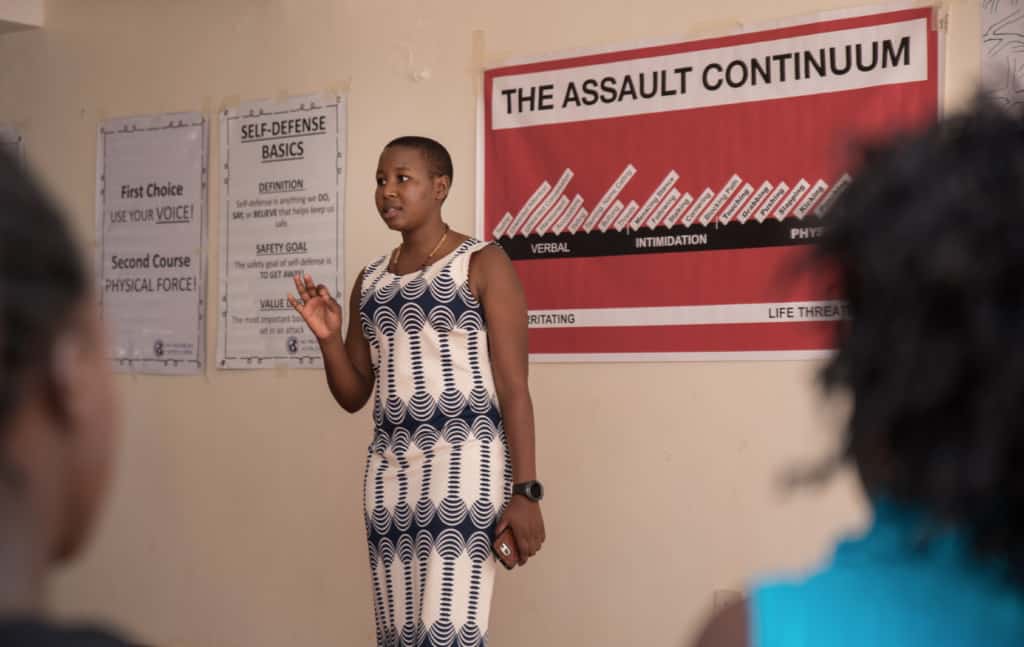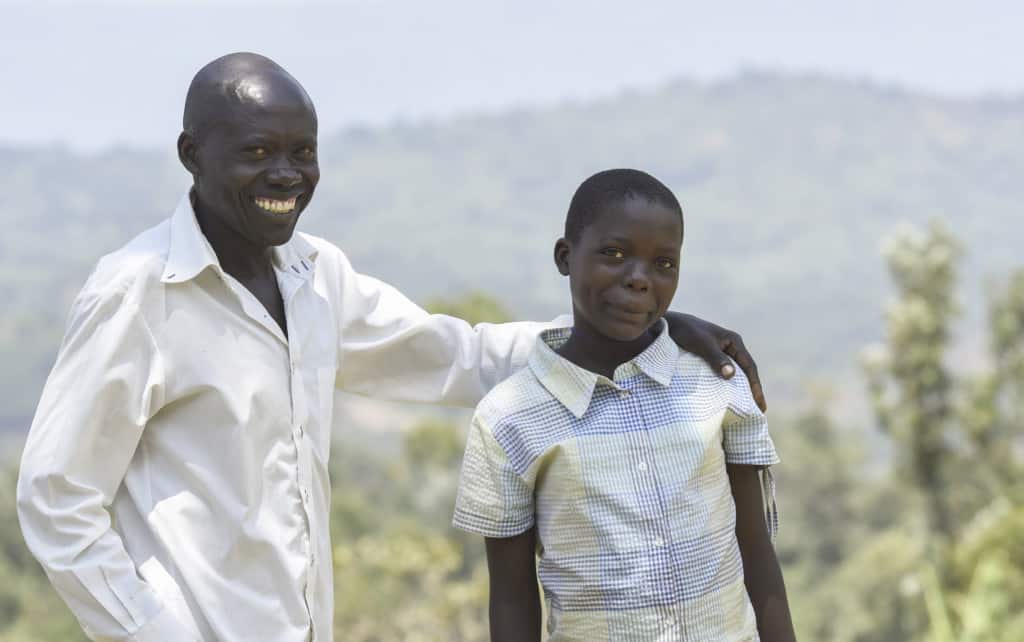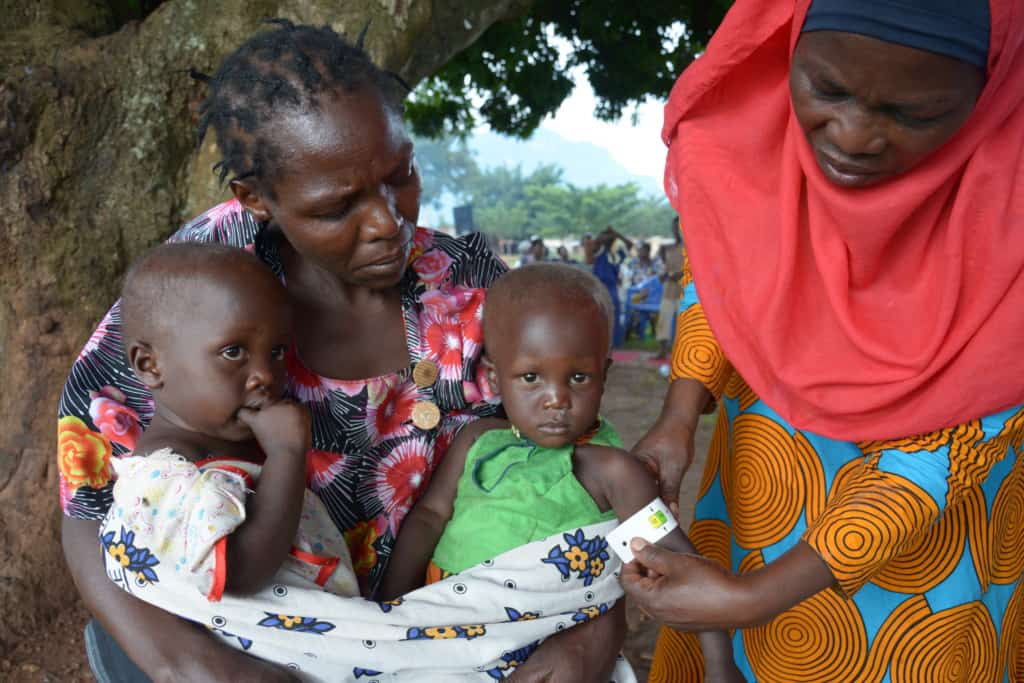The Better Outcomes for Children and Youth Program
in Eastern and Northern Uganda
The Bantwana Initiative of World Education
The Bantwana Initiative of World Education
BOCY employed a socio-ecological model designed to both prevent and respond to HIV and GBV.

BOCY reached 137,000 vulnerable children and families by capacitating government, civil society partners and 3,600 para-social workers (PSWs) to coordinate and deliver a case management approach at scale. This comprehensive and coordinated approach enabled PSWs to respond to individual and household-level needs, and establish effective clinic and community coordination with clinic actors that ensured access to health/HIV, socio-economic, education and child protection supports across communities, school and clinics.
Case conferences at clinic- and community-level helped to address leakages in ART retention and adherence through coordinated follow up of children and adolescents living with HIV at household level and linked child protection cases to Uganda’s formal system for improved monitoring and resolution of urgent cases.
Clinic-Community Linkages: Strong collaboration with government and clinic partners, along with close tracking, monitoring and follow up ensured timely response to urgent child protection cases and access to HIV and GBV prevention and response services for children and adolescents.
Mobile Technology Accelerating HIV Coordination and Response: Effective case management requires efficient communication across many actors. In partnership with Uganda cell phone leader, MTN, WEI/Bantwana’s Closed User Group (CUG) innovation scaled up a low-cost, in-service phone network in partnership with MTN Uganda linking more than 3,000 child protection, clinic, education, police, and district actors together to improve their timely response to cases.
Upskilled 2,900 PSWs trained in HIV- and GBV -sensitive case management across 22 districts in eastern and northern Uganda
Established 258 clinic partnerships with 3,200 health and community cadres service delivery, follow-up and monitoring of HIV and child protection outcomes for children
Improved the viral load suppression rate for children living with HIV by 17% over one year
Resolved 11, 261 child protection cases, an increase of 28% over one year
BOCY delivered services to 11,994 children and adolescents living with HIV. To boost adolescent viral load support, we tested a Caregiver Engagement model with 132 caregivers and children at six high volume clinics. With clinic partners, we layered an integrated package of economic, parenting, and ART literacy supports on Peer Support Groups. This package bolstered treatment literacy, improved disclosure, strengthened adherence and emotional support in families and boosted families’ capacity to pay for children’s core needs.
The journey to health and resilience: Brian’s story
“There are many others like me in the [Peer Support] group it is good to talk about our lives together. Sometimes my father comes with me to the facility so we can learn this important information together. Now, he encourages me when I feel bad. If I cannot leave school to pick up my pills, my father does it for me.” -Brian, age 15, Lira District
25% improvement in disclosure of HIV status by caregivers to adolescents under their care
39% improvement in knowledge of ART treatment literacy by caregivers
68% increase in positive communication between caregivers and their children
23% increase in viral load suppression outcomes for adolescents
BOCY’s economic strengthening services guided families towards resilience and stability. Our Village Savings and Loan Plus model helped families to improve money management and to plan, start, and support income generating activities.
Savings packages layered financial literacy, market-linked income generating activities and entrepreneurship on savings groups, emphasizing financial resilience, confidence and autonomy for out-of-school adolescent girls and young women to reduce reliance on men and related HIV and GBV risks.
A look inside the intervention: BOCY layered savings groups with parenting, HIV, and GBV and community protection information. This intensive engagement sensitized and supported caregivers to introduce family-based budgeting and mobilized members for HIV testing services – including male partners.
Strengthened the economic resilience of 22,669 HIV-affected and impacted households
Delivered critical HIV/health, education and food supports to 94,074 destitute children through 260,000 USD OVC Fund raised entirely by saving group members
Built the economic capacity of 27,313 youth through savings groups, alternative skilling, modern farming and linkages to safe agribusiness opportunities
Our positive youth development package built the agency, social assets, life skills, and HIV and GBV prevention skills of youth to protect themselves from violence and HIV and become change agents in their families, communities and schools.
“After joining the Club, I now have friends. As a young mother, I can now speak to people in my community without feeling shame. I learned about HIV and realized why I was at risk and got tested. I am HIV negative and know how to stay negative.” -Rose, 17-year-old adolescent mother, Oyam District
Empowered 74,253 adolescent youth to prevent and respond to violence and HIV at home and in schools and communities
Equipped 27,313 youth with modern farming, livelihoods and leadership skills through the program and partnership with government and other youth programs
Activated 12, 000 youth ‘change agents’ to mobilize peers, caregivers, schools and communities to improve child safety in schools and communities
BOCY delivered DREAMS to 20,675 adolescent girls and young women, providing a layered package of social asset building, parenting, education and economic strengthening supports. The program built confidence, skills and knowledge to reduce HIV and GBV risks and linked girls and their partners to critical HIV services.
Equipped 20, 765 DREAMS girls with a mix of HIV/GBV prevention, HIV testing, livelihood and education supports
99% of DREAMS girls remained HIV negative after four years
BOCY delivered the evidenced-based No Means No curriculum to 5,018 girls in two high GBV prevalence districts in eastern Uganda. The program increased girls’ confidence to use verbal and physical skills to protect themselves against all forms of gender-based violence (GBV) and sexual abuse.

“When we started the training, I felt weak. I never felt worthy in the community because I saw that everything was done by men. I always felt intimidated when I saw many wrong things happening … I learned to use the power of my voice to protect myself. I can now fight for violence survivors in our community…” – Christine Watera, 20-years-old, No Means No Facilitator, Mbale District
45% improved individual agency to protect themselves
38% strengthened self-defense knowledge
32% increased reporting of abuse
BOCY delivered the evidence-based SINOVUYO Parenting curriculum to 94,987 caregivers and their children. Sinovuyo works with vulnerable families to reshape family communication and strengthen emotional bonding to build resilience in families and prevent child abuse. BOCY supported Model Fathers, Model Families and Adolescent Change Agents to champion child safety in their families, schools and communities.
“ Before the parenting program, I used to beat my [two] wives and my children and disappear with money. After my sons persuaded me to join the parenting sessions, I began to realize how I was affecting my family … I learned how much better I could feel solving problems without conflict. Now, we are a model family and I engage other men about how to be a positive role in the home and reduce their children’s risk to violence. -Mafabi Muzambiro, Model Father, Mbale District

17% reduction in adolescent HIV and GBV risk behaviors
80% reduction in harsh discipline by parents towards their children
42% increase in strengthened emotional support between adolescents and their caregivers
Our early childhood development (ECD) model stimulated children’s cognitive, physical, social, and emotional development. This rich ECD program fostered strong collaboration between clinics and communities, delivering nutrition screening, cooking demonstrations, and backyard gardens to 27,385 HIV positive and vulnerable mothers and their babies.

“I learned how to make nutritious porridge for my grandson. I know how to monitor his growth and development. Without this group, my grandson wouldn’t be walking now.” –Grandmother living with HIV raising her two-year-old grandson, Kamuli District
Delivered and evidence-based, comprehensive early childhood development (ECD) services to 18,447 vulnerable children under 5 years old
Layered ECD stimulation and nutrition on clinic programming for 12,989 new mothers and HIV-exposed infants
The Bantwana Initiative of World Education thanks USAID, the Government of Uganda and our local partners: AVSI Foundation, MUCOBADI, m2m, SOS, and AIC. We look forward to continuing our work together to advance and sustain Uganda’s 95 95 95 epidemic control and social development goals.